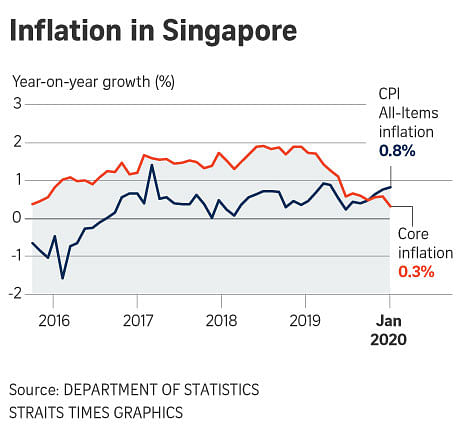SINGAPORE - Core inflation in Singapore slowed sharply in January to a four-year low on the back of a steeper fall in the prices of goods, lower services inflation as well as a rebasing of the consumer price index (CPI), according to official data released on Monday (Feb 24).
Looking ahead, economic uncertainty, including the effects of the coronavirus outbreak, will likely discourage firms from passing on any cost increases to consumers, the Monetary Authority of Singapore (MAS) and the Ministry of Trade and Industry (MTI) said in a report commenting on the data.
Core inflation, which excludes the costs of accommodation and private road transport, came in at 0.3 per cent on a year-on-year basis last month, lower than the 0.6 per cent recorded in December 2019.
Overall inflation stood at 0.8 per cent in January, unchanged from the previous month.
Both figures missed the industry forecasts by analysts in a Bloomberg poll, which pegged core inflation and overall inflation to come in at 0.9 per cent.
But MAS and MTI noted that part of the fall in core inflation also reflected the impact of the CPI rebasing to 2019 from 2014. The rebasing is done once every five years to reflect the latest consumption pattern of resident households. It includes changes to the weights as well as the sample of items and outlets selected for the compilation of the CPI.
MAS and MTI said overall inflation figures remained consistent as higher private transport inflation and an increase in accommodation cost were offset by lower inflation in the core inflation basket.
They forecast that in the quarters ahead, external sources of inflation are likely to remain benign amid weak demand conditions and generally well-supplied food and oil commodity markets.
On the domestic front, labour market conditions continued to soften slightly, which could lead to a moderation in unit labour cost growth this year.
"At the same time, economic uncertainty, including the effects of the Covid-19 outbreak, will likely discourage firms from passing on any cost increases to consumers," they said.
They expect inflationary pressures to remain subdued in the near term and they will closely monitor price trends in the coming months, including the impact of the rebasing of the CPI on inflation rates.

At this stage, the 2020 forecasts for MAS core inflation and overall inflation remain at 0.5 to 1.5 per cent.
For January, private transport inflation rose to 4.6 per cent, compared with the 3.3 per cent in December, with a steeper rise in car prices.
The cost of electricity and gas fell at a slower pace, at minus 8.1 per cent compared with the 11.4 per cent drop in December, as regulated electricity tariffs increased even while the Open Electricity Market continued to have a dampening effect on overall electricity prices.
Accommodation costs rose to 0.3 per cent in line with a pickup in housing rentals, which saw a turnaround in January after more than five years of decline.
Food inflation was unchanged, at 1.7 per cent, as a larger increase in the prices of non-cooked food was offset by a smaller increase in the prices of prepared meals.
But the cost of retail and other goods recorded a steeper drop, with a 1.4 per cent slip in January as the prices of medical products and clothing and footwear registered larger declines.
Services inflation was also lower, at 0.5 per cent, mainly on account of a decline in tuition and other fees, reflecting the effect of enhanced pre-school subsidies.
There was also a smaller increase in telecommunication services fees, as well as a larger fall in the cost of healthcare services, MAS and MTI noted.


